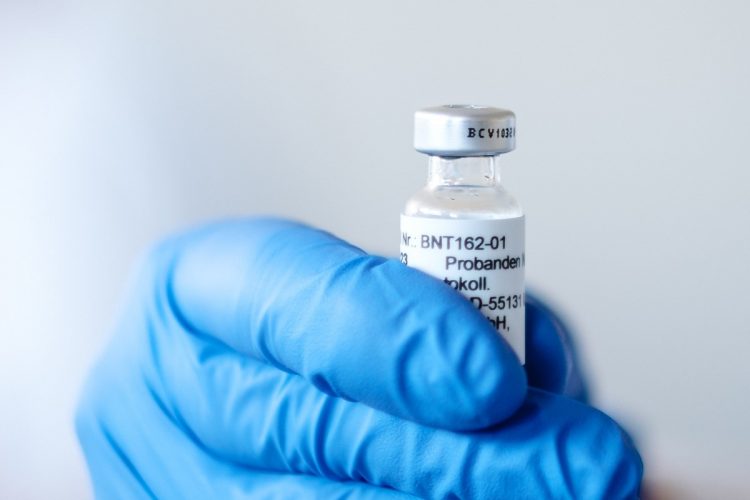COVID-19 Vaccine Progress: BioNTech And Pfizer’s BNT162b1 RNA-Based Vaccine Elicits T Cell And Neutralizing Antibodies Response In Phase 1/2 Trial
Source: COVID-19 Vaccine Progress Jul 22, 2020 4 years, 9 months, 4 days, 8 hours, 31 minutes ago
COVID-19 Vaccine Progress: The Phase ½ clinical trial of BioNTech And Pfizer’s BNT162b1 RNA-Based Vaccine has demonstrated that the vaccine is able to elicit both T Cell And Neutralizing Antibodies Response.

The trial results were published by researchers from Germany and the United States on a preprint server and are yet to have been peer-reviewed.
https://www.medrxiv.org/content/10.1101/2020.07.17.20140533v1
The study indicates that a novel BNT162b1 RNA-based vaccine against the SARS-CoV-2 coronavirus induces functional and proinflammatory T cell responses in almost all participants, marking another landmark achievement for this promising vaccine candidate.
As certain cases of asymptomatic virus exposure have been linked to cellular immune response without seroconversion, indicating that SARS-CoV-2-specific T cells may be relevant in disease control, even in the absence of neutralizing antibodies, the fact that this new vaccine is also able to elicit T Cell response along with antibodies is a positive sign.
Simply put, the messenger RNA (mRNA) vaccine technology allows delivering precise genetic information encoding a viral antigen together with an intrinsic adjuvant effect to antigen-presenting cells. Preclinical models against multiple viral targets have proven the effectiveness of this approach.
Furthermore, fast and highly scalable mRNA manufacturing and lipid-nanoparticle formulation processes allow speedy production of many vaccine doses, which makes it amenable for rapid vaccine development and adequate pandemic vaccine supply.
This trial study is a second, non-randomized open-label phase 1/2 trial in healthy men and non-pregnant women, aged between 18 to 55 years of age. Most participants were Caucasian, with one Asian and one African American participant.
The concentrations of IgG antibodies and SARS-CoV-2 neutralizing titers were assessed at baseline, 7, and 21 days after the priming dose, and 7 and 21 days after the boosting dose. Additionally, CD4+ and CD8+ T cell responses were characterized prior to priming vaccination and 7 days after boost vaccination.
Highly coordinated immune response
Lead researchers Professor Dr Ugur Sahin from Johannes Gutenberg University Medical Center-Germany told Thailand Medical News, "We observed concurrent production of neutralizing antibodies, activation of virus-specific CD4+ and CD8+ T cells, and robust release of immune-modulatory cytokines such as interferon-gamma, which represents a coordinated immune response to counter a viral intrusion.”
It was observed that a majority of study participants had Th1-skewed T cell immune response (which supports cell-mediated immunity) with pronounced CD8+ and CD4+T cell expansion. Interferon-gamma was produced by a high fraction of CD8+ and CD4+ T cells specific for the receptor-binding domain (RBD) of the spike glycoprotein of SARS-CoV-2.
It was observed that all vaccinated volunteers mounted RBD-specific T cell responses detected with specific assays, which was performed without prior expansion of T cells. Albeit the strength of the T-ce
ll responses varied significantly between participants, the researchers observed no clear dose-dependency of the T cell response strength.
Dr Sahin added, "The study confirms the dose-dependency of RBD-binding IgG and neutralization responses and reproduces our previous findings for the 10 and 30 µg dose levels of BNT162b1 in the U.S. trial.”
A significant observation is that two shots of BNT162b1 at a dose level as low as 1 µg were capable of inducing RBD-binding IgG levels higher than those observed in convalescent sera.
Also it was seen that two BNT162b1 doses of 1 to 50 µg induced robust CD4+ and CD8+ 32 T cell and strong antibody response, with RBD binding IgG concentrations clearly exceeding those in a COVID-19 convalescent human serum panel.
Dr Sahin added, "The robust RBD-specific antibody, T-cell and favorable cytokine responses induced by the BNT162b1 mRNA vaccine suggest multiple beneficial mechanisms with the potential to protect against COVID-19.”
This study however is not without limitations. First of all, the sample size is rather small and restricted to participants below 55 years of age. Furthermore, deconvolution of epitope diversity, the characterization of HLA restriction, and the persistence of potentially protective immune responses over time have not been studied.
Despite these limitations, the results are quite promising and indicate that stimulation and robust expansion of T cells might be achieved at the lowest mRNA-encoded immunogen levels.
For more on
COVID-19 Vaccine Progress, keep on logging to Thailand Medical News.
